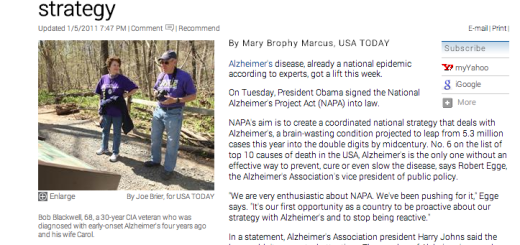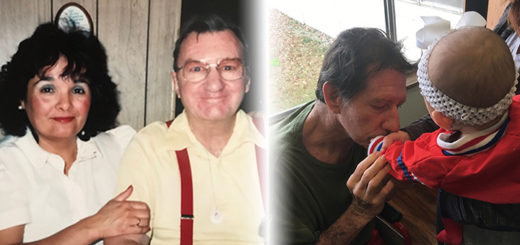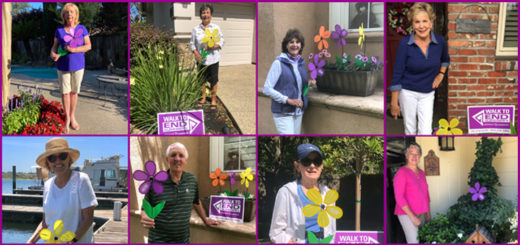National Board member promotes education as a way to combat stigma
Alex Tsao has been volunteering for the Alzheimer’s Association for more than 10 years and currently serves on the National Board of Directors. Initially, Alex didn’t have a connection to the disease but shortly after he joined the Board, his father was diagnosed with Alzheimer’s. Alex encourages others to become educated about Alzheimer’s in an effort to reduce the stigma in his community.
A leader in aviation
Alex’s father is a quiet man who is warm and genuine. He loves his four children. After growing up in China, Alex’s parents moved to Taiwan when they were in their early 30s.

Alex’s dad served in the Republic of China’s (Taiwan) Air Force. “He was a very smart man,” said Alex. “Every year the Taiwanese Air Force would select two people as part of an exchange program with the U.S. in order to share information on the most recent Air Force technology. My father was selected for this program twice; it was an honor.”
After his time in the military, Alex’s dad went on to work with a civilian aviation company in Taiwan. He was one of a handful of people to be licensed by the U.S. FAA as a certified trainer for mechanical engineers who worked on aircrafts.
Eventually, Alex’s parents moved to the United States, first to Texas and then to the California Bay Area. “They continued to be very active and travel,” said Alex. “No matter where they lived, they got along with their neighbors. That says a lot about who they were.”
Where is Dad
In 2011, Alex’s dad was in an accident, fracturing his femur. The surgery went well but afterwards, he seemed very disoriented. He couldn’t remember why he was in the hospital and refused to stay in bed.
Once he was discharged and back in his own home, things began to improve. Alex and his mom decided to go on a quick trip to the neighborhood grocery store, leaving Alex’s dad home alone. They told him where they were going and that they’d be back soon. When they returned home Alex’s dad was missing.
“We started looking for him at any place that was close to their home that they liked to go to,” said Alex. “Fortunately, we found him sitting at one of these places just waiting for us. He must have gone to find us and, once he started walking, he just took a familiar route. He had forgotten that we had told him we were going shopping.”
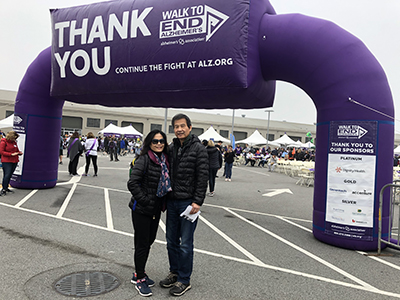
Language barrier delays diagnosis
After the scary incident of losing his dad, Alex and his family decided it was time for Alex’s dad to see a doctor. “We went to see a good neurologist,” said Alex. “He was a very young Chinese American doctor and was more comfortable conversing with my dad in English. My dad, having lived in the U.S. for a long time, was fluent in English, and we didn’t think it would be an issue.
“The doctor gave my dad the test in English, but because my dad was most likely in the early stages of the disease, he kept getting confused [because English was his second language] and was unable to take the test. It’s hard to take a test if you don’t understand the language.”
The next step was to give Alex’s dad an MRI, which was a struggle. Alex said, “It was a challenge for him to remember to stay still in the machine. He didn’t understand why.” The results of the MRI confirmed that Alex’s dad had Alzheimer’s.
Confronting stigma
There is a stigma in some Asian cultures, where people view an Alzheimer’s diagnosis as shameful, not just for the person with the disease but also for the entire family. “My mom is a proud woman and from a prominent family in China,” said Alex. “She has the confidence that nothing she does is wrong. However, she feels like it is her fault that my dad has Alzheimer’s, since she is the one who has cared for him all these years.
“I have learned a lot from the Alzheimer’s Association. Knowledge about the disease will empower you to understand that this is a disease and help you plan around it. It will unburden you from the guilt. I have had a hard time trying to transfer this knowledge to my mom. I want to help her understand that this is not her fault, this is not her failure.”

Joining the chapter board
In 2008, prior to his father’s diagnosis, Alex began volunteering for some local nonprofits and eventually was introduced to the Alzheimer’s Association. “I participated in a few functions hosted by the local chapter,” said Alex. “I understood what a wonderful organization the Alzheimer’s Association is and how important the work they do is for the country and the world.”
In 2010, Alzheimer’s Association staff members, Edie Yau and Peining Chang convinced Alex to join the Board of Directors for the Northern California and Northern Nevada Chapter. Alex shared, “I knew this would be a meaningful volunteer opportunity to do something about a major health issue.”
When his father was officially diagnosed in 2011, it reaffirmed his decision to volunteer. Alex said, “it just shows me that anybody can face Alzheimer’s disease.”
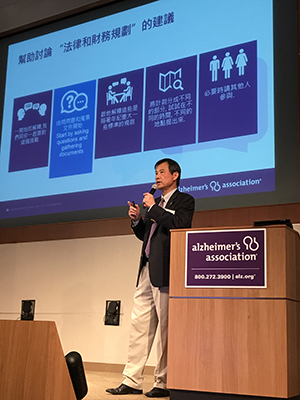
Educating the community
Alex also participates in the annual Chinese Forum either as a participant or moderator. The Forum is beneficial for people who want to learn more about the disease, the advancements in research, hear from other caregivers and find out about available resources.
“For many people Alzheimer’s is something new,” said Alex. “A large percentage of Chinese Americans in this country are recent immigrants. They want to learn more about the disease in general and what it means for someone in their family.
“For people who are more knowledgeable about the disease, the Forum provides information about the most recent scientific developments. This includes information on new treatments and updates on finding a cure.”
Expanding education through technology
This year, the Chinese Forum was moved from an in person event to a webinar, with great success. There was a total of 441 people registered and 540 people viewed the webinar. There were viewers not only in the California Bay Area but from other states and even other countries.
“This year’s forum showed us that we can take advantage of the technology available and not be limited by geography,” said Alex. “The caregiving journey for families is a long and challenging journey and having access to this forum will help them tremendously.”
Contributing on a national level
Alex is no longer on the local board but has moved up to sit on the National Board of Directors. Alex says, “It’s important to have representation for the Chinese American and Asian communities.
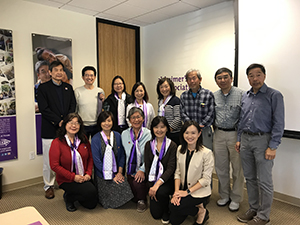
“I enjoy being involved in the direction of the Association, and how we carry out the mission. Everyone on the staff and on the Board are wonderful people. It has been an amazing experience, and this is an important organization to be involved with.”
The Alzheimer’s Association has two upcoming Chinese webinars this spring:
- May 30: Taking Care of the Unknown, presented in Mandarin
- June 13: 2020 Chinese Alzheimer’s Webinar Forum, presented in Cantonese
For additional Chinese resources such as support groups and education classes visit our website here.
Learn more:





